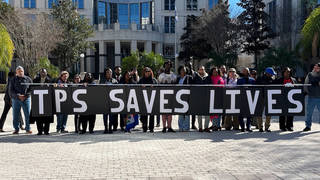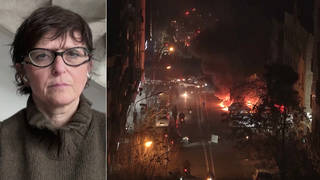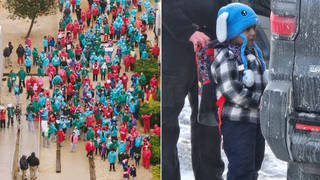
Guests
- Meron Rapoporteditor at the independent Israeli news site Local Call and a columnist for +972 Magazine.
A damning new report reveals how Israel is systematically making Gaza unlivable. The independent news outlet +972 Magazine has spoken to Israeli soldiers who describe how they have been using bulldozers and explosives to intentionally flatten Gaza.
In the southern city of Rafah, 73% of buildings are completely destroyed, with only about 4% of the infrastructure remaining undamaged. “The real aim is to make it impossible for the Palestinians to return to these areas,” says Meron Rapoport, co-author of the +972 Magazine report.
Transcript
AMY GOODMAN: This is Democracy Now!, democracynow.org, The War and Peace Report. I’m Amy Goodman, with Juan González.
We turn now to a new report that reveals how Israel is trying to make Gaza unlivable. It’s been well documented that Israeli airstrikes account for mass casualties. Now the independent news outlet +972 Magazine has spoken to Israeli soldiers who reveal new details about how they’ve been systematically using bulldozers and explosives to flatten Gaza from the ground. For example, Gaza’s Government Media Office says the Israeli army has destroyed at least 90% of residential neighborhoods in the southern city of Rafah.
The +972 report features videos Israeli soldiers shared online, like this one by Avraham Zarviv, who operates a D9 armored bulldozer. His nickname is “Flattener of Jabalia” — the northern town of Jabaliya in Gaza. In this video, he uses his camera to show a flattened landscape in Rafah.
AVRAHAM ZARVIV: [translated] Very good, Givati Brigade, very good. Yes, Rafah. “Rafah, end,” as they say. There will be no more battle in Rafah, because there will be no more Rafah. The nation of Israel lives.
AMY GOODMAN: For more, we’re joined in Tel Aviv by Meron Rapoport, editor and writer at the independent Israeli news site Local Call and a columnist at +972 Magazine, where his new piece with Oren Ziv is headlined “'Render it unusable': Israel’s mission of total urban destruction.”
Meron, welcome back to Democracy Now! Why don’t you lay out what you found and these — the access you had, well, because they post them online publicly, to these Israeli soldiers’ actual video accounts themselves of what they’re doing in Gaza?
MERON RAPOPORT: I think that Gaza is being destroyed, and is already destroyed. This is not really new. We know that. We know that there are very few buildings standing in Rafah. What we have discovered in this investigation, Oren Ziv and I, is that this is a premeditated — that most of it is premeditated, that this is the routine work of soldiers today, or in the last year, or maybe more than a year, since the beginning of 2024. The routine work is to destroy, that this is what they are doing as a routine army service. They go out in the morning. They either accompany bulldozers or a unit that is responsible for explosives. They go, choose buildings and flatten them in a systematic way, and that the aim is quite — it is being said to them — of course, this is not official orders coming from the general headquarters of the Israeli army, but this is very bluntly told — they are being told, and they are themselves very proud of it, that the real aim is to make it impossible for the Palestinian to return to these areas. We have seen that now in these days in Rafah. In Rafah, we are telling that 4% of the buildings in Rafah are unhurt, undamaged. Only 4%, a city of 210,000, 200,000 people before the war. So, it is a systematic thing. It is not done by — it’s not during battle. It’s not even a result of airstrikes, although, of course, airstrikes are responsible for some of the damage. It is a planned thing. And in this, I think it is unprecedented.
JUAN GONZÁLEZ: And, Meron, you open your piece quoting a soldier you identify only as “Y.,” and he describes the demolition methods — and I’m quoting you — you write, quote, “I secured four or five bulldozers [from another unit], … they demolished 60 houses per day.” Six-oh. “A one or two story house, they take down within an hour; a three or four-story house takes a bit longer. … The official mission was to open a logistical route for maneuvering, but in practice, the bulldozers were simply destroying homes.” So, this is — to reiterate what you said, this is not in the process of a battle. This is supposedly after, let’s say, there’s been a battle or conflict, what the Israeli soldiers are doing. So, this is total ethnic cleansing of an entire territory, is effectively what they’re doing, isn’t it?
MERON RAPOPORT: Effectively, yes. Of course, this goes into some gray zone in the international law, what is called domicide, the destruction of whole urban areas. It is not officially a crime against humanity. It is certainly against the laws of war to destroy buildings that have nothing to do with military action. But, yes, I think this — there is no doubt that the intention here is ethnic cleansing. The intention here is to make these cities — Rafah, Jabaliya, the Netzarim Corridor, for the moment — maybe we are seeing something new in the next days — but to make these areas completely impossible — it will be completely impossible for the population to come back, because there is nothing left. And it is being said quite openly by the soldiers, by the videos that they air themselves, by soldiers who spoke to us. It is quite clear that this is the intention.
Now, the IDF, in its official response to us, said that, “No, this is a part of operational — there’s operational needs that require this demolitions of houses, and this has to do only with operational needs, houses or buildings where there were — they shoot at Israeli soldiers, or there were explosives. Hamas planted explosives in these houses.” But what we are seeing is so clear. And again, Netanyahu, Prime Minister Netanyahu himself, said that “We are destroying house by house so they will have nowhere to come back to.” Bezalel Smotrich, the finance minister, said just yesterday that “We are not leaving even one stone standing.” So, it’s very clear that the IDF reaction is not based on reality.
JUAN GONZÁLEZ: And did you discover any moral qualms among some of the Israeli soldiers that you interviewed about this practice?
MERON RAPOPORT: Yes, of course. The soldiers that talked with us didn’t feel — didn’t feel good or felt very bad with what they were doing. This is the reason they talked to us. We talked about it with about 10 soldiers.
But they also said that this is such a routine now for Israeli soldiers that they don’t really — that most of the soldiers do not pay much attention, because this is the routine. This is what they do. There’s very little real fighting. And one soldier who spent three months in the Netzarim Corridor said that he had very, very little real fighting in all these three months. And the routine work was to, if there were enough explosives, because sometimes there were not enough explosives, but if there were enough explosives, they would go in the morning, choose between five, 10 houses to demolish, and this is the routine work. So, the soldiers really were very used to it. And, of course, there were these soldiers that were politically motivated, right-wing soldiers, that really rejoiced in the fact that these Palestinian will have nowhere to return to. But this is not the main, I would say, atmosphere. The atmosphere is: “This is the work we are doing, and we just do it. That’s what we are sent for.”
AMY GOODMAN: Meron Rapoport, I wanted to ask you about Microsoft’s support for Israel. The Associated Press reports that Microsoft has now acknowledged “it sold advanced artificial intelligence and cloud computing services to the Israeli military during the war in Gaza and aided in efforts to locate and rescue Israeli hostages,” unquote. Microsoft confirmed this in an unsigned blog post. On Monday, a Microsoft worker who’s a member of the No Azure for Apartheid disrupted Microsoft CEO Satya Nadella’s keynote address at the company’s flagship Build event in Seattle, Washington.
NO AZURE FOR APARTHEID MEMBER: Satya, how about you show how Microsoft is killing Palestinians? How about you show how Israeli war crimes are powered by Azure? As a Microsoft worker, I refuse to be complicit in this genocide!
AMY GOODMAN: I wanted, Meron, to get your response to these developments and what we know about Microsoft’s role, as you’ve edited reports by +972 on Microsoft, including one in January headlined “Leaked documents expose deep ties between Israeli army and Microsoft,” in a piece that was written by Yuval Abraham, who won the Oscar for being a co-director of the film No Other Land, Meron.
MERON RAPOPORT: Yes, it seems that this is — of course, there was this report by Yuval, and then there was a previous report quoting mainly Israeli sources, open sources, the head of a unit that is responsible for computing in the Israeli army, that she said that they received essential help to the Israeli war machine from these big three cloud companies, Azure and other — so, this is — and we had these documents that we revealed, that Yuval revealed later on. So, the relationship is certainly very close, and it does seem that this creates problems for Microsoft internally, and maybe externally and internally. We have to see. We have maybe other reports coming. I think this story is not over.
JUAN GONZÁLEZ: And, Meron Rapoport, you have — the United Nations reported in March that from March 2025 since the beginning of 2024, Israel has demolished 463 buildings in the West Bank as part of military activity, and it’s displaced nearly 40,000 Palestinians from several cities in the West Bank. Could you talk about that? And also, you’ve reported that in Lebanon, Israel used similar demolition operations?
MERON RAPOPORT: It does seem that this has become really part of the Israeli war, the way, the modus operandi of Israeli army: destruction per se, not during fighting. We have seen that in Lebanon. We had reports in our investigation in which a soldier was told in advance that what he’s going to do is to destroy the Shiites’ villages in Lebanon, even before he came in. So, it didn’t have anything — it didn’t have direct relation to the fightings. And it seems that this —
AMY GOODMAN: Meron, we have 30 seconds.
MERON RAPOPORT: — way of action — it seems that this way of action is being copied and employed in the West Bank, as well.
AMY GOODMAN: I want to thank you so much for being with us, Meron Rapoport, editor and writer at the independent Israeli news site Local Call and a columnist at +972 Magazine. We’ll link to your new article, “'Render it unusable': Israel’s mission of total urban destruction.” Meron was speaking to us from Tel Aviv.
Coming up, Palestinian student Mohsen Mahdawi graduates from Columbia University three weeks after he was released from a Vermont prison after being targeted by the Trump administration. Stay with us.
[break]
AMY GOODMAN: “Grateful” by Patti Smith in our Democracy Now! studio.













Media Options